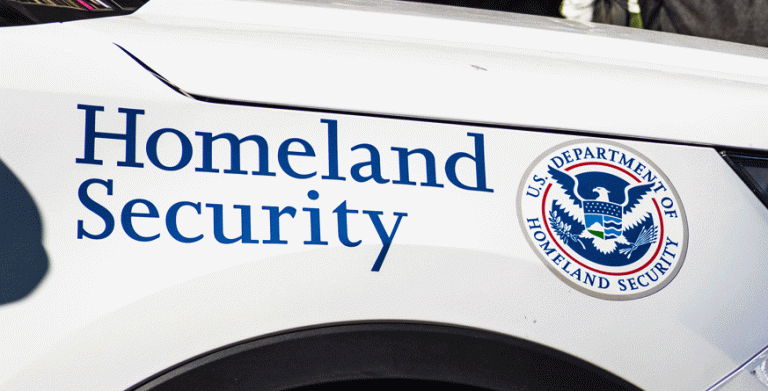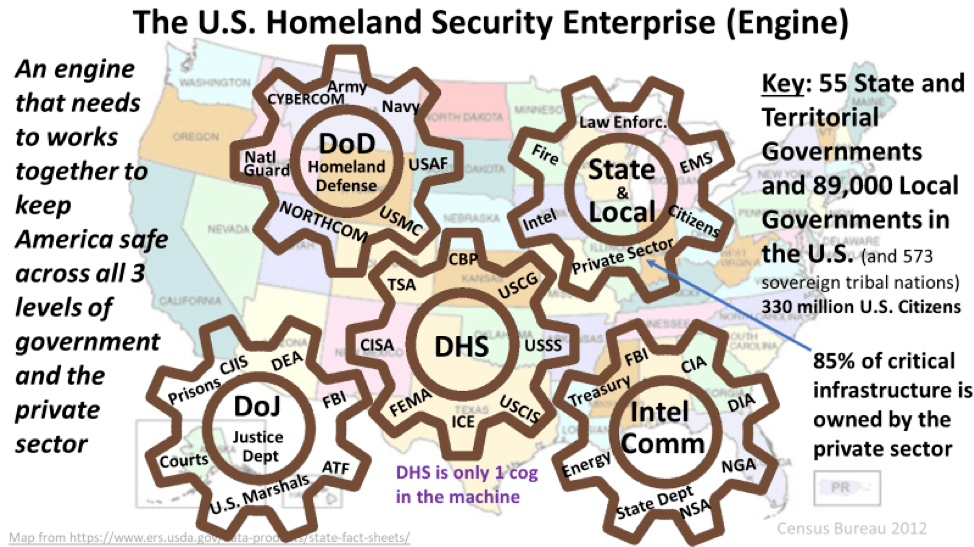By Dr. Jeffrey V. Gardner | 02/03/2020

There is a relatively common perception that “Homeland Security” equals the Department of Homeland Security (DHS). However, even Congress recognizes that DHS “…does not incorporate all of the homeland security functions at the federal level, even if one constrains the definition of homeland security to the narrow field of prevention and response to domestic acts of terrorism.”
This single agency view also fails to recognize that some of the most important homeland security efforts in the United States are performed by critical elements of state and local governments. In addition, private sector entities own 85 percent of our critical infrastructure.
This article seeks to illuminate some of the issues around the comprehensive meaning of U.S. homeland security as well as offer a graphic illustration to describe the related concept of the homeland security enterprise.
Defining Homeland Security a Relatively New Term
Before we can make a concerted effort at defining the Homeland Security Enterprise (HSE), we must first take a stab at defining homeland security. This is a relatively new term that came about after the 9/11 terrorist attack.
The United States suffered its last significant foreign invasion during the War of 1812 when British forces attacked and burned parts of the nation’s capital, including the White House and the Library of Congress and after the war, external threats to the homeland became a secondary consideration. The national security emphasis of the U.S. since then has been on the military deploying to fight overseas – focusing on the “away game.” However, during the Cold War of the second half of the 20th century there was a concerted nationwide Civil Defense effort to prepare for and respond to a nuclear attack.
Since 9/11 there have been many different domestic security laws, White House strategies, DHS plans, and national-level security reviews that attempted to define the mission, goals, and responsibilities for homeland security.
However, these efforts only addressed the DHS homeland security missions and responsibilities, not the full spectrum of roles shared across the federal government, let alone the critical contributions of state, local and private sector partners.
The Homeland Security Act of 2002 simply directed the new DHS to prevent terrorism, reduce vulnerabilities, and recover from crises. But when it comes to “preventing terrorism” for which DHS was created, that is primarily the role of the Federal Bureau of Investigation. “The FBI has legal authority to gather intelligence, conduct investigations, and arrest suspected terrorists. DHS does not have similar authorities.”
Almost 20 Years after 9/11, the Nation Still Lacks an Accepted Definition of Homeland Security
Almost 20 years after 9/11 the nation still lacks an accepted definition of Homeland Security. This lack of an approved homeland security construct hampers our security cohesiveness. “Varied homeland security definitions and missions may impede the development of a coherent national homeland security strategy, and may hamper [its] effectiveness,” William L. Painter, a specialist in homeland security and appropriations, warned in the Congressional Research Service in May 2017.
Developing an effective homeland security strategy, however, “may be complicated if the key concept of homeland security is not defined and its missions are not aligned and synchronized among different federal entities with homeland security responsibilities,” Painter wrote. Again, this point still leaves out the highly important state, local, and private sector actors who greatly outnumber federal security officials and who own, manage, and secure almost the entirety of our critical infrastructure.
Homeland Security Is a Decentralized, Multidimensional and Multifunctional Effort
For the purposes of this article, Homeland Security is a decentralized, multidimensional and multifunctional effort to secure the nation and its citizenry from threats, build resilience, and prepare for and respond to incidents. While the DHS is the lead federal agency for homeland security, responsibility for these efforts spans all levels of the government and the private sector. Key partners encompass many federal, state, local and private entities, as well as some non-profit organizations and even citizens themselves.
Homeland Security is a broad collection of complex interrelated issues that requires a unified approach, according to the DHS (2019) Strategic Plan. The Quadrennial Homeland Security Review of 2014 describes the five missions of homeland security as follows:
- prevent terrorism and enhance security
- secure and manage the borders
- enforce and administer immigration laws
- safeguard and secure cyberspace
- strengthen national preparedness and resilience
It cannot be emphasized enough that Homeland Security does not equal the Department of Homeland Security. In fact, some 30 federal agencies receive homeland security funding, of which only 52 percent goes to DHS.
The Homeland Security Enterprise (HSE) is a much more accurate description of the constellation of agencies and actors across all three levels of government and the private sector. This should encompass all the key stakeholders with a role in the security of the nation and our people.
Of course, it includes the DHS and its eight operational components, but there are many other essential federal agencies as well. They include the FBI, the intelligence agencies, the military (NORTHCOM, CYBERCOM, the National Guard and other units) as well as the Department of Energy, and even Health and Human Services (Centers for Disease Control).
One way to think about these entities working together across all levels of government and the private sector is to think of them as cogs in a machine or an engine. Of course, DHS is a major cog, but so are the intelligence community and the military.
This graphic illustration of the HSE as an engine helps to visually depict the complex and interconnected nature of our national homeland security efforts. But whether the cogs are all turning well together or grinding hard against one another is best left for a book rather than an article.
